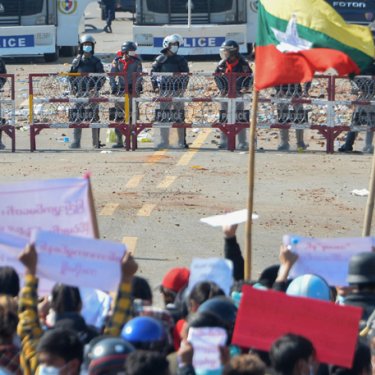“Press freedom set back ten years in ten days” after coup in Myanmar

Ten days after the coup by the Tatmadaw, Myanmar’s armed forces, Reporters Without Borders (RSF) has taken stock of the difficulties encountered by journalists on the ground, which include threats, intimidation and censorship. Myanmar is back where it was ten years ago, before the disbanding of the junta in February 2011 allowed a free press to emerge.
The situation is worsening by the day. A journalist with the news Yangon-based agency Democratic Voice of Burma (DVB), who is not being named, was arrested yesterday while covering demonstrations in Mandalay, in the centre of the country, where martial law was imposed three days before.
Also yesterday, a reporter for the Mizzima News website, Than Htike Aung, was wounded by rubber bullets fired by police while covering a protest in the capital, Naypyidaw.
Outside the country, journalists have been extremely active in their coverage of the situation in Myanmar. Media outlets that have their headquarters abroad, such as the US broadcaster Radio Free Asia, can ignore the censorship imposed by the new junta, but this is not the case for local media.
Sitting on the fence
“Media based inside the country, such as the Standard Times or those that are part of the Eleven Media group, cannot report the real situation,” a journalist based in Yangon, the economic capital, told RSF on condition of anonymity. “They cannot take the risk. They are sitting on the fence. If they go too far in reporting the truth, they will definitely end up in jail.”
On the day after the 1 February coup, reporters began hearing from a confidential source close to the military that a “blacklist” of journalists earmarked for arrest is being circulated.
“Every night we hear different rumours about arrests of journalists,” said another Yangon-based journalist. “Every morning when I check the news, I’m worried that I will see a report that someone I love was arrested overnight,” she said.
The new junta says it wants to establish a “disciplined democracy” but has yet to tell the media how it intends to handle them. “We’re working with a lot of uncertainty,” she added. “We have no idea whether we will be allowed to cover events openly or not.”
The desire to cover what it is happening right now is posing a dilemma for many journalists.
“During the past few days, we’ve been covering this historical moment with a great deal of fear,” said a freelancer, who also asked RSF not name him. “But I continue to cover the news as it happens because it’s so important to provide real reporting from the field.”
Impossible retreat
With the state media limiting themselves to relaying military propaganda, social media have become a leading source of news. But people have had to use VPNs (virtual private networks) to circumvent the blocking of social media such as Facebook, Twitter and Instagram since 2 February.
“What with censorship, threats and intimidation, press freedom has suddenly been set back ten years in ten days,” said Daniel Bastard, the head of RSF’s Asia-Pacific desk. “We call on the Tatmadaw’s commanders to allow journalists to freely cover the big peaceful demonstrations. This is the best way to ensure they don’t degenerate into violence. The military need to understand that the people of Myanmar are now used to a free press. A sudden return to the past is clearly out of the question.”
The military junta that had been in power for half a century was disbanded exactly ten years ago, in February 2011. Dozens of journalist and bloggers were freed under an amnesty a few months later. Shortly thereafter, prior censorship was abolished for all media outlets, which until then had been obliged to submit any story about politics or religion for approval by the authorities.
After being on a blacklist that prevented it from visiting Myanmar for 25 years, RSF published a report entitled “The Burmese Spring” in January 2013 that examined the hopes raised by these developments and their limitations.
Myanmar is ranked 139th out of 180 countries in RSF's 2020 World Press Freedom Index.



